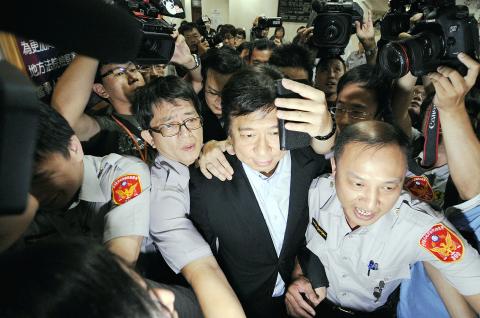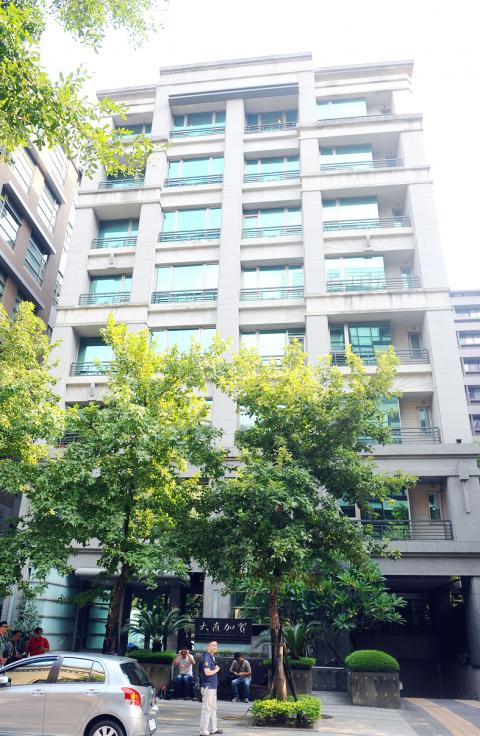Former Mainland Affairs Council (MAC) deputy minister Chang Hsien-yao (張顯耀) was yesterday summoned for questioning on suspicion of leaking state secrets related to cross-strait negotiations with China, while the Ministry of Justice’s Investigation Bureau approved a search warrant for Chang’s residence in Taipei’s Dazhi District (大直) and six other locations.
Taipei prosecutors also questioned three other people, one of whom was reportedly Chang’s assistant, Chen Hung-yi (陳宏義).
They were questioned as witnesses.

Photo: Chen Chih-chu, Taipei Times
The questioning was still ongoing at press time last night.
Taipei District Prosecutors’ Office spokesman Huang Mo-hsin (黃謀信) refused to reveal the identities of the three witnesses.
The office had summoned the council’s economic affairs department director Lee Li-jane (李麗珍), planning department director Hu Ai-ling (胡愛玲) and politics and legal affairs department director Yeh Ning (葉寧) on Tuesday night for questioning after it found discrepancies in some of the available data.

Photo: Chang Chia-ming, Taipei Times
Prosecutors yesterday said that Chang has been restricted from leaving the country since Friday last week, adding that the case has been reclassified from code Ta (他) to code Zhen (偵).
According to legal practice, filing cases under code Ta indicates that prosecutors consider the person’s conduct to be suspect, but lack sufficient evidence to prove that the person is a criminal. Code Zhen indicates that legal grounds for suspicion have been established, but not enough to lay charges.
Sources also said that the national security investigators had discovered Chang leaking secrets three years ago, adding that the Mainland Affairs Council’s proof came from a wiretap on Chang.
If allegations of leaking secrets are substantiated, the district prosecutors’ office would continue the investigation if the secrets did not involve national security, the sources said, but the case would be forwarded to the Taiwan High Court if the secrets are confirmed to be linked to national security.
Separately, on questions of whether the national security system had legally obtained permission to wiretap Chang, Taiwan High Court spokesman Tsai Chung-tun (蔡炯燉) said the case had been deemed top secret and only the judge who approved the wiretap knew about the matter.
Tsai added that the court could not offer any other answer even if the queries came from the Control Yuan or the Legislative Yuan.
The concern over illegal wiretapping stemmed from the Special Investigation Division’s alleged wiretapping of the Legislative Yuan switchboard and multiple legislators during what was deemed a political scheme to oust Legislative Speaker Wang Jin-pyng (王金平) from his post in September last year by President Ma Ying-jeou (馬英九).
Meanwhile, Huang said Chang has refused to submit to questioning by the Investigation Bureau and stated he would answer only to the district prosecutors’ office, while the other three witnesses were making their statements at the bureau.
The office does not rule out filing a request to detain Chang, Huang said.
Additional reporting by Lin Ching-chuan, Chien Li-chung, Yang Kuo-wen and Peng Hsien-chun

Seventy percent of middle and elementary schools now conduct English classes entirely in English, the Ministry of Education said, as it encourages schools nationwide to adopt this practice Minister of Education (MOE) Cheng Ying-yao (鄭英耀) is scheduled to present a report on the government’s bilingual education policy to the Legislative Yuan’s Education and Culture Committee today. The report would outline strategies aimed at expanding access to education, reducing regional disparities and improving talent cultivation. Implementation of bilingual education policies has varied across local governments, occasionally drawing public criticism. For example, some schools have required teachers of non-English subjects to pass English proficiency

‘FORM OF PROTEST’: The German Institute Taipei said it was ‘shocked’ to see Nazi symbolism used in connection with political aims as it condemned the incident Sung Chien-liang (宋建樑), who led efforts to recall Democratic Progressive Party (DPP) Legislator Lee Kun-cheng (李坤城), was released on bail of NT$80,000 yesterday amid an outcry over a Nazi armband he wore to questioning the night before. Sung arrived at the New Taipei City District Prosecutors’ Office for questioning in a recall petition forgery case on Tuesday night wearing a red armband bearing a swastika, carrying a copy of Adolf Hitler’s Mein Kampf and giving a Nazi salute. Sung left the building at 1:15am without the armband and apparently covering the book with a coat. This is a serious international scandal and Chinese

TRADE: The premier pledged safeguards on ‘Made in Taiwan’ labeling, anti-dumping measures and stricter export controls to strengthen its position in trade talks Products labeled “made in Taiwan” must be genuinely made in Taiwan, Premier Cho Jung-tai (卓榮泰) said yesterday, vowing to enforce strict safeguards against “origin laundering” and initiate anti-dumping investigations to prevent China dumping its products in Taiwan. Cho made the remarks in a discussion session with representatives from industries in Kaohsiung. In response to the US government’s recent announcement of “reciprocal” tariffs on its trading partners, President William Lai (賴清德) and Cho last week began a series of consultations with industry leaders nationwide to gather feedback and address concerns. Taiwanese and US officials held a videoconference on Friday evening to discuss the

PERSONAL DATA: The implicated KMT members allegedly compiled their petitions by copying names from party lists without the consent of the people concerned Judicial authorities searched six locations yesterday and questioned six people, including one elderly Chinese Nationalist Party (KMT) member and five KMT Youth League associates, about alleged signature forgery and fraud relating to their recall efforts against two Democratic Progressive Party (DPP) legislators. After launching a probe into alleged signature forgery and related fraud in the KMT’s recall effort, prosecutors received a number of complaints, including about one petition that had 1,748 signatures of voters whose family members said they had already passed away, and also voters who said they did not approve the use of their name, Taipei Deputy Chief Prosecutor